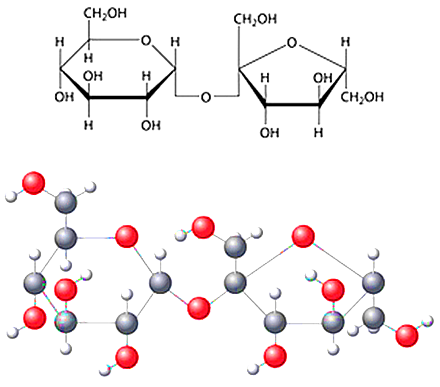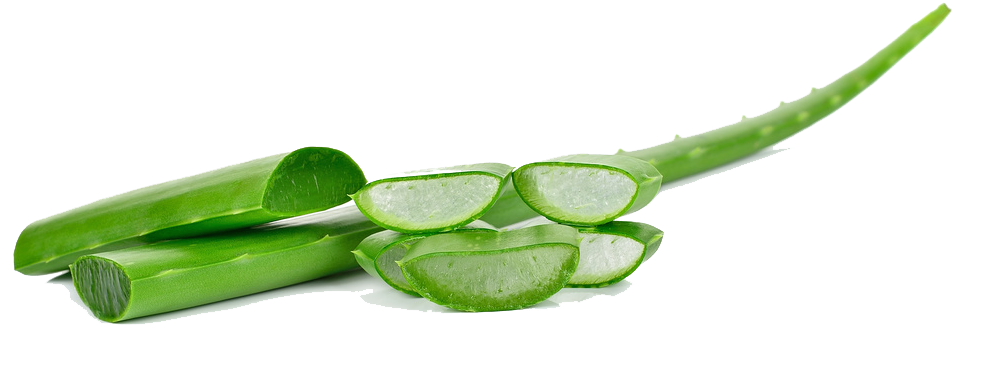
Synergy effects
Up to the present date, a minimum of 160 important ingredients have been identified in the rich aloe vera leaves. Some experts surmise that the plant could contain as many as 300 to 400 life essential ingredients. Scientists agree in so far that it is not one single ingredient that accounts for the aloe vera’s healing effects but that it is a synergy effect of all combined ingredients. And this is exactly what makes the plant so very special: It contains a variety of essential properties that compliment each other and combined have a powerful effect. The combined properties supply the human body with a wealth of healing substances.
Mono- and polysaccharide

Monosaccharide and polysaccharides have anti-inflammatory, antibacterial, antiviral, anti-mycotic and immune-stimulating effects. These properties enhance digestion and bind numerous detrimental substances such as cholesterol and gall acid. Most importantly are the long-chain sugars (especially the polymannan sugars) which enter the intestinal wall undegraded and then have an immune regulating effect in the blood. Or they stick to the intestinal wall and therefore prevent undesired substances from entering the bloodstream. The most important ingredient is the acemannan which cannot be produces by adults. It supports the immune system, is anti-inflammatory and bolsters the digestive system in its absorption of vital substances.
As an example, the following substances belonging to this group were found in aloe vera gel: Acemannan, aldopentose, arabinose, cellulose, galactose, galacturonic acid, glucoronic acid, glucose, hexanoic acid, mannose, mannuronic acid, pentosan, rhamnose, uronic acid, xylose.
Amino acids
There are 20 different amino acids which our body requires in order to rejuvenate. The crux of the matter is that the human body cannot produce these amino acids by itself. If these life essential components are lacking in our nutritional diet it can result in severe deficiency syndromes.
Aloe vera gel contains at least seven of the eight essential amino acids. In addition, it has a lot of the non-essential precious amino acids which enhance the human organism.
Enzymes
Enzymes are endogenous catalysts which enable, accelerate or prevent chemical processes. The enzymes contained in the aloe vera gel help with digestion and in absorbing the sugars, proteins and lipids of our daily food intake. Leading scientists agree that a portion of the enzymes present in aloe vera gel can destroy free radicals, i.e. environmental poisons, within the human organism.
Among others, the following enzymes are to be found in aloe vera gel: Phosphatase, amylase, bradykinae, carboxypeptidase, catalase, cellulase, lipase and peroxidase.
Aloe vera Gel enthält mindestens sieben der acht essentiellen Aminosäuren. Dazu kommen noch viele der nichtessentiellen wertvollen Aminosäuren, die den menschlichen Organismus positiv unterstützen.

The highly adaptogenic characteristics of the Aloe plant itself, as well as the smart supplements developed by the Company Forever Living, are a great help in order to increase general health and well being. Both act in prevention and support self-healing processes within the human body. Adaptogenes are plant substances that prevent stress and protect the human body from harmful influences and to the same time decrease the negative effects of the same. One of the primal conditions for a plant to be called adaptogenic is that it is not poisonousness no matter how much and how frequently it is taken.
Dr. Susanne Schwemmlein
Minerals and micronutrients
Minerals and micronutrients are an essential part of the human diet and crucial for maintaining a condition of good health. They are vital for the functionality of vitamins and enzymes and partly also influence each other in their roles. An imbalanced relation of the individual micronutrients plays a major role with regards to cancer and heart attacks. The following minerals and micronutrients all contribute to the overall positive influence of aloe vera:
- Iron is, amongst other attributes, is important for the haematosis, the immune system and for improving general well-being.
- Calcium is essential for healthy bones and teeth, it is also important for the blood coagulation and the routing of impulses in muscles and nerves.
- Magnesium is important for the functionality of numerous enzymes; it eases the over-stimulations of muscles and nerves and protects the heart from arterial disease. Magnesium is especially important for individuals who live with a high level of stress “anti-stress mineral”.
- Manganese helps the body with the detoxifying processes and is needed for the haematosis and bones, cartilages, fibres and connective tissue.
- Selenium assists the cells in the destruction of free radicals which are produced by stress, environmental exposures, cigarette smoke etc. Moreover, it is very important for the immune defence. In the case of insufficient selenium the tissue ages more quickly.
- Zinc protects from free radicals and strengthens the immune system. It also accelerates the wound healing process and stops inflammation.
- Other important minerals and micronutrients in aloe vera are:
Chromium, potassium, copper, sodium

Vitamins
In comparison to a lot of fruit and vegetables, the vitamin content of aloe vera is relatively low; however, the vitamin content in aloe is crucial for the synergy effect of all of the other ingredients. The following vitamins are contained in the aloe plant::
- Vitamin B1 is important for balance of energy in the human organism. The slightest deficiency can lead to exasperation and physical weakness.
- Vitamin B2 is necessary for the detoxification processes as it steers oxidation processes. It is also important for the building of red blood cells.
- Vitamin B6 is as co-enzyme vital for the amino acid metabolism and is also necessary for the synthesis of haemoglobin.
- Vitamin B12 is important for the synthesis of nucleic acid. Deficiency leads to the decrease in the cell division of the bone marrow (pernicious anaemia). As this vitamin is usually only present in animal products, for vegetarians it is very important to supplement their diet with aloe vera gel.
- Vitamin C strengthens the immune system, it is necessary for the growth of bones, teeth, blood and hormones; it protects the body cells from premature aging and stops the effects of toxins.
- Vitamin E neutralises free radicals and therefore protects the cells from premature aging. It accelerates the healing process, helps with rheumatic issues and strengthens the heart and cardiovascular system.
Secondary plant compounds
Secondary plant compounds are only to be found in small amounts in plants but they do determine the taste, smell and colour and they are very pharmacologically effective. Mostly, they are highly effective in a pharmacologic way.
Amongst others, aloe vera gel contains:
- Essential oils that can work both in an anti-inflammatory and anti-bacterial way
- Lignins are dietary fibres that stimulate digestion and can penetrate the skin deeply where they work as carriers for other important substances by binding them and transporting them into even deeper skin layers.
- Salicylic acid, the agent of aspirin, works as a pain killer, decreases fever and stops inflammation.
- Sterols work in an anti-inflammatory capacity and decrease the blood cholesterol level
- Saponins are glycosides that account for up to 3% content of the aloe vera gel, they have a cleansing and anti-septic effect. These substances are very important for the germ-killing qualities of aloe vera gel with bacteria, virus, fungi and yeasts.
- Anthraglycosides are mainly found in the skin of the leaf and they have a laxative effect. In high concentrations these substances are toxic but in the case of the aloe vera gel where the content is very low the effect is antibacterial, anti-fungi and antiviral.
- Tannic acids are polyphenols which have an anti-inflammatory and anti-micro bacterial effect.